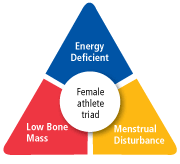Why Young Female Athletes Face a Unique Set of Health Risks
December 01, 2016
 University Hospitals Rainbow Babies & Children'sExperts in Children's Health
University Hospitals Rainbow Babies & Children'sExperts in Children's Health
While the benefits of sports participation for girls clearly outweigh the risks, sports participation can put female athletes at risk for female athlete triad, a syndrome involving the three interrelated components of energy availability, menstrual function and bone health.
Amanda Weiss Kelly, MD, Chief of Pediatric Sports Medicine at University Hospitals Rainbow Babies & Children’s Hospital, says that girls involved in sports that concentrate on aesthetics, such as cheerleading, dance or gymnastics, or encourage leanness, such as running and other endurance sports, are at higher risk.
“The conditions are triggered when an athlete isn’t consuming enough calories to meet the body’s energy needs,” Dr. Weiss Kelly says, adding that girls don’t need to have an eating disorder to be affected by the female athlete triad.
What Should Parents Know?

Having even one of the triad conditions can lead to long-term health issues, such as poor bone health.
The best thing parents can do is to be sure that girls involved in sports take in enough calories to meet their energy output, Dr. Weiss Kelly says.
She also urges parents to be on the lookout for stress fractures, irregular or missed periods, and other signs of a potential problem.
“Menstrual problems are more difficult to pick up on, but a lack of periods or very irregular ones need checking,” Dr. Weiss Kelly says.
She also notes that your child’s doctor should ask questions to screen for signs of the triad during routine office visits and pre-participation sports physicals.
The questions, which focus on eating habits and views, menstrual period patterns, and muscle and bone issues, help pinpoint issues and next steps.
“For instance, if your daughter has a stress fracture, but she hasn’t increased training and is having irregular periods, tests can be done to check her bone health,” Dr. Weiss Kellysays.
And while the emphasis is on girls, boys can also be affected with bone issues and eating problems, Dr. Weiss Kelly says.
5 ways to support your young athlete:
- Offer healthy, well-balanced snacks and meals.
- Stay up-to-date with well-child exams and pre-participation sports physicals.
- Find out if her doctor is screening for signs of triad conditions.
- Ask about taking calcium, vitamin D or other supplements.
- Consult a registered dietitian to discuss daily calorie needs and a meal plan.
To schedule an appointment with a UH Rainbow Babies & Children’s pediatrician or pediatric sports medicine specialist, call 216-UH4-KIDS (216-844-5437) or visit Rainbow.org.


